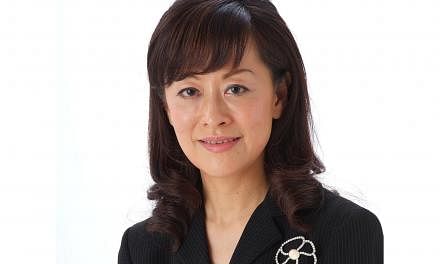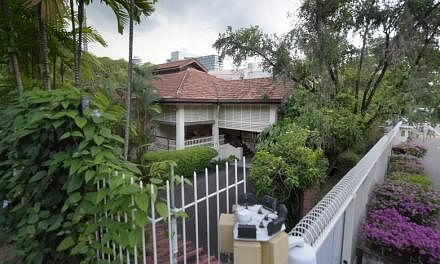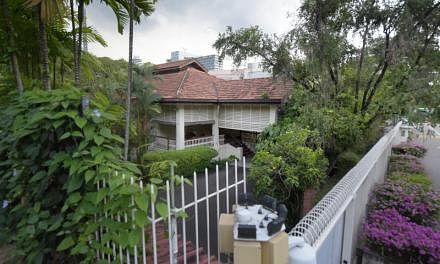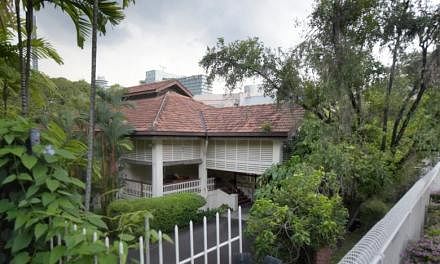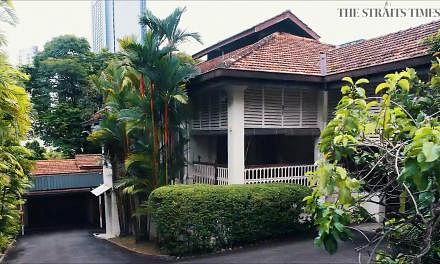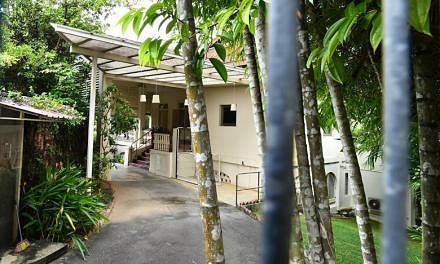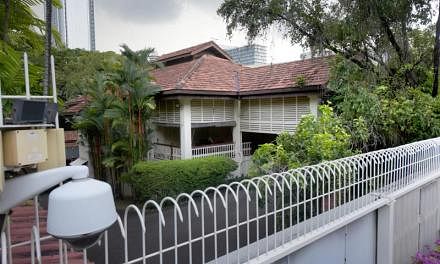After two days of debate in Parliament on the Oxley Road issues, what has emerged?
I would say: Three bright red lines have been drawn, if we can see them.
Murky allegations have swirled for three weeks about Prime Minister Lee Hsien Loong. These centre on charges that he abused his power as PM to block the demolition of his late father's house at 38, Oxley Road. That the allegations came from PM Lee's own siblings - brother Hsien Yang and sister Wei Ling - lent them weight, and rocked a nation.
As charge and counter-charge were posted on Facebook, denting the image of the Lees, the Government and Singapore, PM Lee decided to call for a parliamentary sitting to discuss the allegations. In so doing, he subjected himself to parliamentary scrutiny.
After two days of debate with at least four ministers making statements and MPs questioning them, PM Lee concluded by saying that the allegations remained unsubstantiated; he had given account of his own actions; and that Parliament could now move on. "People can see that there has been no abuse of power, by me or my Government," said PM Lee.
He did not see a need to call for a select committee, as some MPs had suggested. He had not sued his siblings in court for defamation, although, as noted throughout the debate, Singapore ministers have sued for far less damaging comments.
But as he made clear, the Government, and he personally, were keeping their options open, depending on what else the siblings might say, since there is "freedom of speech" and no one can control what they might say.
He acknowledged that it was unrealistic to expect that the session would lead to a full resolution of the dispute as it was unclear what else might follow. But at least the session had helped clear the air, he argued.
There was indeed an airing of issues that had first been brought to the public domain by the Lee siblings. Within its narrow ambit, Parliament carefully deconstructed and examined the issues and came to a conclusion: that there was no case to answer.
Yet, whether the matter rests here remains in doubt. Within hours of the close of the session, fresh Facebook posts were flying about, with Dr Lee Wei Ling putting up a riposte to disagree with PM Lee's account of the proposed $1 deal for the house that fell through.
So, despite the confidence-building outcome within Parliament, many Singaporeans out there will feel, as Workers' Party (WP) MP Leon Perera noted, that there is "no closure" yet to the whole issue, until the siblings substantiate their allegations and these are examined by an independent panel, or court, or committee.
I agree there is no closure yet. But that is in part because the Lee siblings look set to continue their war of words against their elder brother. The fact that the accusations are likely to continue, however, is no reason to say the Parliament sitting that has just ended was a waste of time.
What that sitting has done is establish that, as of July 4, the elected legislature of Singapore examined the allegations made thus far, and did not find them serious enough to take any action on.
That is the first bright red line drawn. Whatever other allegations may be made later, is for another time.
The second bright red line drawn is that PM Lee accounted for his actions in Parliament, which accepted them.
Although the accusers were absent, their accusations were very much present. PM Lee answered the most serious charges:
•That he abused his power as PM to influence decisions on what to do with the Oxley house.
•That he manipulated a ministerial committee into doing what he wanted.
•That he misused his power as PM to get information about an agreement made between his siblings and the National Heritage Board over items that the siblings gave from their father's estate for a heritage exhibition.
On each of these specific charges, PM Lee gave clear, detailed accounts, corroborated by Deputy Prime Minister Teo Chee Hean and National Development Minister Lawrence Wong, who are both members of the ministerial committee set up to explore options for the Oxley Road house.
DPM Teo said PM Lee recused himself from decisions on the Oxley house and that the committee operated independently.
Mr Wong said the information PM Lee received about the exhibition gifts as PM would have been given to him in his personal capacity anyway as a beneficiary of the estate of the late Mr Lee.
Nominated MP Chia Yong Yong pressed the last point and asked Mr Wong to clarify whether PM Lee getting the information about the deed of gift as Prime Minister was the same as Mr Lee the private individual and beneficiary getting the information.
Mr Wong, as the minister in charge, said "yes, for all intents and purposes I see no difference".
Whether one agrees with Mr Wong or not, the minister in effect cleared PM Lee of wrongdoing.
As observers watching the Lee siblings' public spat unfold, it is crucial that we try to distinguish between charges directed at Mr Lee Hsien Loong as their brother, and charges about his conduct as PM.
So far, it would appear, their charges made as of July 4, about his abuse of power as PM, did not stick.
He may or may not have been a model son or brother, he could or could not have done better to handle family disagreements as the eldest child, but those family dynamics are irrelevant to the present situation, where we are tasked only to assess whether he abused his power as PM.
So that is the second bright red line. Whatever one thinks of his actions as a family member, Mr Lee Hsien Loong as PM has shown Parliament his actions stand up to scrutiny.
The third bright red line is that, at least in the parliamentary forum, a public accounting has been made.
Parliament is not a reality game show or a frivolous entertainment arena. It is a serious forum. MPs are elected and have the full moral and legal weight of voters' mandate to back them. When they say Aye or Nay, their words matter.
It has to be thus, or we can forget about parliamentary democracy.
To be sure, Singapore's system is far from perfect. A House dominated by People's Action Party MPs will likely hold back on criticising its own leader, especially at a moment as politically charged as this one.
On Monday, Senior Minister of State Janil Puthucheary spoke of iron sharpening iron as a characteristic of robust debate; alas what I heard in Parliament over these two days was more akin to the thud of wood hitting wood. Apart from the WP MPs and some NMPs like Ms Chia, who quizzed PM Lee and his ministers, and a few PAP MPs such as Ms Sun Xueling and Mr Zaqy Mohamad, most of the others confined themselves to reading out prepared speeches rather than taking on board the new disclosures, and drilling deep into them.
For all the questions raised, no MPs from any corner of the House seemed to take the side of PM Lee's accusers, or offer any evidence to back up their claims, let alone advance them to killer effect.
The third bright red line, therefore, is that, whatever its faults, the House took a close look at allegations of abuse of power by PM Lee and appeared to conclude that there was no basis for those charges.
What's next? The Lee siblings do not look like they will desist from making more allegations. As Emeritus Senior Minister Goh Chok Tong said, in his trademark blunt manner, Mr Lee Hsien Yang's end game may well be to push for PM Lee to resign.
He said: "From what Lee Hsien Yang and his wife are freely telling many others, it is clear that their goal is to bring Lee Hsien Loong down as PM, regardless of the huge collateral damage suffered by the Government and Singaporeans.
"It is now no more a cynical parlour game. If the Lee siblings choose to squander the good name and legacy of Lee Kuan Yew, and tear their relationship apart, it is tragic but a private family affair. But if in the process of their self-destruction, they destroy Singapore too, that is a public affair."
It was WP chief Low Thia Khiang, in a candid, hard-hitting speech on Monday, who coined the term bright red lines in this debate. He said: "The problem with this whole saga is that the line between the private and the public has been blurred and crossed too many times by the Prime Minister, the Lee siblings and the Government too.
"We need to restore the line, make it a bright red line, resolve the aspects of dispute that have crossed into the public domain and push the dispute back into the private domain."
Unfortunately, from the events of the last three weeks, it looks like Singaporeans will have to put up with blurred lines between private and public, family and national issues, for a while longer.
But at least for now, there has to be some consolation about the bright red line drawn in this debate: That on July 4, based on evidence presented publicly so far, Singapore's elected legislative body implicitly affirmed that the allegations against Mr Lee Hsien Loong for abuse of power as PM were unfounded.
Whether that bright line becomes red from bloody internecine warfare later, no one can tell.

